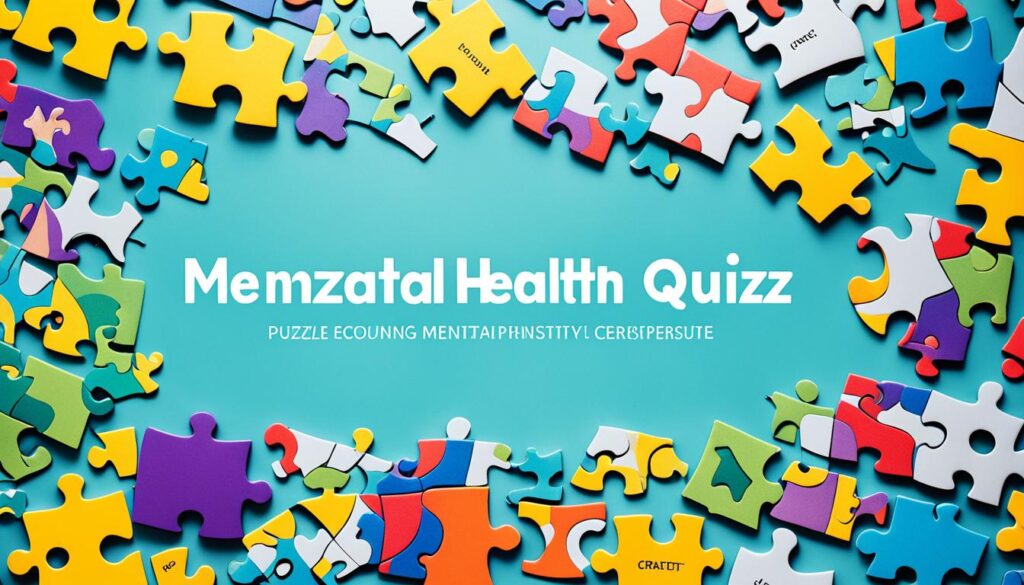Did you know that more than 9% of the U.S. population is affected by personality disorders? That equates to around 30 million individuals dealing with challenging emotional and mental patterns that can impact their everyday lives. If you suspect that you or someone you know may be exhibiting symptoms of a personality disorder, utilizing a personality disorders test can be a beneficial resource in recognizing potential signs and seeking proper treatment.
Key Takeaways:
- A significant portion of the U.S. population, approximately 30 million people, are affected by personality disorders.
- Taking a personality disorders test can help identify potential signs of a personality disorder.
- A personality disorders test cannot replace a professional diagnosis, but it can provide insights into emotional and mental patterns.
- If you experience symptoms such as intense loneliness, fear of abandonment, distrust of others, or chronic suicidal thoughts, seeking treatment from a licensed mental health provider is recommended.
- By understanding and addressing potential personality disorders, you can embark on a journey towards improved emotional well-being.
Understanding Personality Disorders
Personality disorders are mental health diagnoses characterized by patterns of behavior and thinking that impact relationships. These disorders can make it difficult to navigate interpersonal connections and contribute to feelings of disconnection, conflict, and emptiness. Individuals with personality disorders often experience challenges in establishing and maintaining healthy relationships, leading to distress and impaired functioning in various areas of their lives.
A personality disorder assessment, based on the DSM-5 criteria, can help identify specific symptoms and guide treatment options. The Diagnostic and Statistical Manual of Mental Disorders, Fifth Edition (DSM-5), provides a comprehensive framework for diagnosing and classifying personality disorders. It outlines specific criteria that mental health professionals use to assess and evaluate the presence of personality disorders.
“Personality disorders are mental health conditions characterized by enduring patterns of thinking, feeling, and behaving that deviate from cultural expectations and cause significant distress or impairment. These patterns are ingrained and inflexible, often stretching back to adolescence or early adulthood.”
Personality disorders can manifest in various ways, each with its distinct set of symptoms and characteristics. Some common types of personality disorders include:
- Borderline Personality Disorder
- Antisocial Personality Disorder
- Narcissistic Personality Disorder
- Obsessive-Compulsive Personality Disorder
- Avoidant Personality Disorder
- Histrionic Personality Disorder
- Dependent Personality Disorder
- Schizoid Personality Disorder
Each personality disorder has unique features and diagnostic criteria as outlined in the DSM-5. Understanding these criteria can provide insights into the nature of the disorder and guide appropriate treatment approaches.
Borderline Personality Disorder (BPD)
BPD is characterized by emotional instability, intense and unstable relationships, impulsive behavior, and an unstable sense of self. Individuals with BPD often experience extreme fear of abandonment, engage in self-harming behaviors, and struggle with chronic feelings of emptiness.
Antisocial Personality Disorder (ASPD)
ASPD is characterized by a disregard for the rights and feelings of others. Individuals with ASPD may engage in criminal behavior, lie or manipulate others for personal gain, and demonstrate little remorse for their actions.
Narcissistic Personality Disorder (NPD)
NPD is characterized by an excessive preoccupation with oneself, a grandiose sense of self-importance, and a lack of empathy for others. Individuals with NPD may have an exaggerated sense of entitlement and require constant admiration and attention.
Obsessive-Compulsive Personality Disorder (OCPD)
OCPD is characterized by a pattern of perfectionism, rigid adherence to rules, excessive attention to details, and a need for control. Individuals with OCPD may place a significant focus on order and organization and have difficulty delegating tasks to others.
Avoidant Personality Disorder (AvPD)
AvPD is characterized by social inhibition, feelings of inadequacy, and hypersensitivity to criticism or rejection. Individuals with AvPD often avoid social situations, have a deep fear of embarrassment, and may struggle to form close relationships.
Histrionic Personality Disorder (HPD)
HPD is characterized by excessive emotionality and attention-seeking behaviors. Individuals with HPD often have an intense desire for approval and may display dramatic or theatrical behaviors to gain attention.
Dependent Personality Disorder (DPD)
DPD is characterized by a pervasive need to be taken care of by others. Individuals with DPD have difficulty making decisions, fear being alone, and may rely heavily on others for support and guidance.
Schizoid Personality Disorder (SPD)
SPD is characterized by a detachment from social relationships and a limited range of emotions. Individuals with SPD may prefer solitary activities, have little interest in establishing close relationships, and tend to be emotionally detached in social interactions.
Understanding the different types of personality disorders can help individuals and their loved ones recognize and seek appropriate treatment. With a proper diagnosis and tailored treatment plan, individuals with personality disorders can work towards improving their functioning, relationships, and overall well-being.
Common Personality Disorders and DSM-5 Criteria
| Personality Disorder | DSM-5 Criteria |
|---|---|
| Borderline Personality Disorder (BPD) | Emotional instability, unstable relationships, self-harming behaviors, chronic feelings of emptiness |
| Antisocial Personality Disorder (ASPD) | Disregard for the rights and feelings of others, criminal behavior, lack of remorse |
| Narcissistic Personality Disorder (NPD) | Excessive preoccupation with oneself, grandiose sense of self-importance, lack of empathy |
| Obsessive-Compulsive Personality Disorder (OCPD) | Perfectionism, rigid adherence to rules, excessive attention to details, need for control |
| Avoidant Personality Disorder (AvPD) | Social inhibition, feelings of inadequacy, fear of rejection, avoidance of social situations |
| Histrionic Personality Disorder (HPD) | Excessive emotionality, attention-seeking behaviors, desire for approval |
| Dependent Personality Disorder (DPD) | Need for others to take care of them, difficulty making decisions, fear of being alone |
| Schizoid Personality Disorder (SPD) | Detachment from social relationships, limited range of emotions, preference for solitary activities |
Identifying and understanding personality disorders is an essential step in addressing the challenges they present. With the support of mental health professionals and appropriate treatment approaches, individuals with personality disorders can work towards managing their symptoms, fostering healthier relationships, and improving their overall quality of life.
The Importance of Self-Assessment
Starting your journey towards understanding your emotional health can be overwhelming. A mental health quiz, while not a substitute for a professional diagnosis, can give you a general idea of whether you may have a specific mental health condition. This self-assessment can be the first step towards seeking treatment and finding the support you need.
It’s essential to prioritize your emotional well-being and take proactive steps towards better mental health. Self-assessment tools like a mental health quiz can provide valuable insights and help you gain a better understanding of your emotional health. While such quizzes do not replace a professional evaluation, they can serve as a starting point for identifying potential areas of concern and seeking appropriate treatment.
By taking a mental health quiz, you can gain valuable insights into your emotional well-being. This self-assessment tool allows you to reflect on your thoughts, feelings, and behaviors, helping you identify patterns and areas that may require further attention. While the quiz does not provide a diagnosis, it can offer guidance on whether seeking professional help is necessary.
Remember, a mental health quiz is not a substitute for professional advice or treatment. If you have concerns about your emotional health, it’s important to consult with a licensed mental health professional for an accurate diagnosis and tailored treatment plan.
Embarking on the journey towards emotional well-being starts with self-reflection and self-assessment. By taking a mental health quiz and being honest with yourself, you can gain insights into your emotional health and take the necessary steps towards finding treatment and support. Remember, seeking help is a sign of strength and a vital part of your well-being.

| Benefits of a Mental Health Quiz: |
|---|
| Provides a general idea of your emotional health |
| Identifies potential areas of concern |
| Prompts further exploration and reflection |
| Encourages seeking treatment and support |
Common Symptoms of Personality Disorders
Symptoms of personality disorders can manifest differently from person to person. However, there are common indicators that may suggest the presence of a personality disorder:
- Intense feelings of loneliness or emptiness
- Significant fears of abandonment in relationships
- Distrust of others’ intentions
- Disconnection from others or a strong desire to distance oneself from relationships
- Feelings of inadequacy and lack of empathy
- Patterns of interpersonal conflict
- Chronic suicidal ideation
These symptoms can cause significant distress and impact various aspects of a person’s life, including personal relationships, work, and overall well-being.
It’s important to note that these symptoms should not be self-diagnosed, as a professional evaluation is necessary to determine the presence of a personality disorder.
“Intense feelings of loneliness and fear of abandonment are often experienced by individuals with personality disorders. Distrust and a tendency to distance oneself from relationships can further contribute to interpersonal conflict and emotional distress.”
It’s essential to seek guidance from a licensed mental health provider if you or someone you know is experiencing these symptoms. Professional help can provide a thorough assessment, diagnosis, and appropriate treatment plan tailored to individual needs.

Taking the Personality Disorders Quiz
Are you ready to gain valuable insights into your personality traits? The personality disorders quiz is a powerful tool that can help you identify specific traits associated with personality disorders. By answering a series of thought-provoking questions, you can gain a deeper understanding of yourself and your emotional well-being.
During the quiz, you will be asked about various aspects of your behavior and attitudes. These questions are designed to explore your level of distrust and suspiciousness towards others, patterns of detachment from social relationships, and lack of desire for close relationships or family connection. The quiz will also delve into your experiences of social anxiety, difficulties in thinking or speaking, irritability, and chronic feelings of emptiness or loneliness.
In addition, the quiz assesses how you feel in situations where you’re not the center of attention, your reluctance to take personal risks, your preference for solitary activities, and your indifference to praise or criticism. By examining these different facets of your personality, the quiz aims to provide a comprehensive assessment of your emotional well-being.
Remember, the personality disorders quiz is not a diagnostic tool. It is an important step towards self-discovery and self-awareness. It can help you recognize potential indicators of personality disorders and guide you towards seeking professional help if necessary.
Example Questions from the Personality Disorders Quiz:
- Do you often find it difficult to trust others?
- Do you frequently feel detached from social relationships?
- Are you uncomfortable in situations where you’re not the center of attention?
- Are you reluctant to take personal risks?
- Do you prefer solitary activities over social interactions?
- Do you feel indifferent to praise or criticism?
Engaging in the personality disorders quiz can be a valuable step towards better understanding yourself and your emotions. However, it’s important to remember that the results of the quiz should not be used as a substitute for professional advice or diagnosis. If you have concerns about your mental health, it is always best to consult with a licensed mental health provider.

Interpreting Assessment Results
After completing the personality disorders quiz, your assessment results will be displayed. It’s important to remember that this self-assessment is not a diagnosis. If the results indicate potential symptoms of a personality disorder, it’s recommended to reach out to a licensed mental health provider for a professional assessment and guidance on treatment options.
Your assessment results serve as a starting point for a deeper exploration of your emotional and mental well-being. While they can provide valuable insights, it’s essential to consult with a licensed mental health provider for an accurate diagnosis and personalized treatment plan.
Seeking guidance from a licensed professional ensures that your concerns are addressed comprehensively and that you receive the appropriate advice and support. A licensed mental health provider possesses the expertise to evaluate your symptoms, consider your individual circumstances, and determine the most effective path forward.
Remember, a professional assessment goes beyond the self-assessment results, providing you with a comprehensive understanding of your mental health. It enables the identification of underlying factors and the development of an individualized treatment plan tailored to your specific needs.
Professional mental health providers employ a variety of assessment tools and techniques to gain a comprehensive understanding of your emotional well-being. These assessments include in-depth interviews, observations, and additional diagnostic evaluations, ensuring a thorough evaluation of your symptoms.
By collaborating with a licensed mental health provider, you can embark on a journey towards improved mental health and well-being. They will guide you through the assessment process and help you develop a personalized treatment plan that encompasses therapy, medication, lifestyle changes, and other recommended interventions.
Why a Licensed Mental Health Provider?
“A licensed mental health provider has the training and qualifications to identify and diagnose personality disorders accurately. They can help you navigate your assessment results, offer professional guidance, and provide evidence-based interventions that can improve your well-being.” – Dr. Emily Smith, Licensed Psychologist

While self-assessment tools can be informative and provide a starting point, they are not a substitute for professional diagnosis and treatment. Licensed mental health providers possess the expertise necessary to interpret assessment results accurately and provide personalized recommendations based on your unique circumstances.
Remember, seeking help is a sign of strength and an important step towards your journey to emotional well-being. Reach out to a licensed mental health provider today to begin your path towards a healthier and happier life.
Unlocking Self-Discovery with Personality Disorder Screening
A personality disorder screening test can serve as a reflective journey through a series of statements to explore the layers of your personality. It’s important to take the test thoughtfully, considering whether the statements align with your behavior or attitudes for an extended period.
While the results of the test may raise flags for potential personality disorders, it’s crucial to consult with a doctor or mental health professional to obtain an accurate diagnosis and determine the most appropriate treatment plan.

Understanding the Personality Disorder Screening Process
The personality disorder screening test involves a series of questions that assess various aspects of your personality and behavior. These questions delve into different areas such as relationships, emotions, and worldview. By answering honestly and introspectively, you can gain valuable insights into your personality patterns and potential areas of concern.
The Importance of Professional Consultation
Although the screening test can provide indications of potential personality disorders, it’s essential to consult with a doctor or mental health professional for a comprehensive evaluation. They can thoroughly assess your results and consider other factors such as personal history, environment, and additional diagnostic criteria.
“The screening test serves as a valuable tool for self-reflection and initial exploration, but a professional consultation is necessary for accurate diagnosis and personalized treatment.” – Dr. Jane Turner, Psychiatrist
| Benefits of Professional Consultation | Drawbacks of Self-Assessment Alone |
|---|---|
|
|
The Role of Professional Diagnosis
It’s essential to understand that self-assessments and quizzes are not intended to replace a professional diagnosis. Only a trained medical professional, such as a doctor or mental health provider, can accurately diagnose mental health conditions. The purpose of these assessments is to help you assess your well-being and determine if further consultation with a professional is necessary.
While self-assessment tools can provide valuable insights into your mental health, they should not be seen as a substitute for a comprehensive evaluation conducted by a licensed professional. Professional diagnoses involve a range of factors, including in-depth evaluations, clinical expertise, and consideration of your unique circumstances and history.
A mental health professional has the knowledge and experience to accurately assess, diagnose, and treat mental health conditions. They are equipped with diagnostic tools and expertise in recognizing and interpreting symptoms, allowing them to develop personalized treatment plans that address your specific needs.
Consulting with a professional is crucial for proper evaluation and access to the most appropriate treatment options. They can guide you through the process, provide support, and offer recommendations based on your individual circumstances. Remember, seeking help is a courageous step towards taking control of your mental health and overall well-being.
“A professional diagnosis is an essential step towards understanding and addressing mental health conditions.”
Consultation with a Mental Health Professional
When you suspect that you may have a mental health condition, it’s essential to seek guidance from a mental health professional. Through an initial consultation, they can evaluate your symptoms, discuss your concerns, and provide a thorough assessment to determine the most appropriate course of action.
During the consultation, your mental health provider will likely ask you questions about your symptoms, medical history, and any related concerns. They may also perform additional diagnostic assessments or recommend specific tests to gather more information.
Based on the evaluation, the mental health professional will provide an accurate diagnosis and collaborate with you to develop a comprehensive treatment plan. This plan may involve therapy, medication, lifestyle changes, and additional support to address your mental health condition effectively.
Remember, reaching out to a mental health professional is a proactive step towards taking charge of your mental well-being. With their expertise and guidance, you can gain a better understanding of your condition and access the necessary support and treatment options.

“Consulting with a mental health professional is crucial for accurate diagnosis and tailored treatment options.”
Exploring Other Mental Health Tests and Quizzes
In addition to personality disorders tests, there are various other mental health quizzes and self-assessments available. These quizzes and self-assessments can provide a valuable opportunity to delve into different aspects of your mental well-being and gain insights into your emotional health. However, it’s important to remember that these online assessments serve as tools for self-reflection and should not be used as diagnostic tools to replace professional advice. If you have concerns about your mental health, it’s always recommended to seek guidance from a licensed mental health professional.
“Online quizzes and self-assessments can be helpful tools for self-reflection. However, they should not replace seeking guidance from a professional if you have concerns about your mental health.”
While quizzes and self-assessments cannot diagnose mental health conditions, they can provide you with a starting point for further exploration and conversations with a mental health professional. These assessments can be particularly useful in raising awareness and encouraging individuals to seek appropriate support and treatment. Remember, mental health is a complex and individualized journey, and the guidance of a professional can provide the necessary insight and expertise to navigate it effectively.
Types of Mental Health Quizzes and Self-Assessments
Here are some examples of mental health quizzes and self-assessments you may come across:
- Depression Screening Quiz
- Anxiety Self-Assessment
- Stress Level Quiz
- Substance Abuse Screening
- Sleep Quality Assessment
These assessments can help you gauge your mental well-being in specific areas and identify potential areas of concern. However, they should not be used in isolation to determine a diagnosis.
Consulting a Mental Health Professional
If the results of a quiz or self-assessment raise concerns or if you’re experiencing symptoms that impact your daily life, it’s important to seek guidance from a mental health professional. A licensed professional will be able to evaluate your situation, provide an accurate diagnosis, and recommend appropriate treatment options tailored to your specific needs.
| Quiz Type | Purpose |
|---|---|
| Depression Screening Quiz | Assess symptoms of depression |
| Anxiety Self-Assessment | Evaluate symptoms of anxiety |
| Stress Level Quiz | Measure stress levels |
| Substance Abuse Screening | Identify potential substance abuse issues |
| Sleep Quality Assessment | Assess the quality of sleep |
Remember, while online quizzes and self-assessments can be helpful tools for self-reflection, consulting with a mental health professional is crucial to receive an accurate diagnosis and develop an appropriate treatment plan that addresses your unique needs.

Finding Support and Treatment
If you suspect that you may have a personality disorder or other mental health conditions, it’s crucial to seek support and treatment from a professional. A consultation with a mental health provider can provide an accurate diagnosis, guide treatment options, and offer the necessary support for your emotional and mental well-being. Remember, reaching out for help is a sign of strength.
“Seeking support from a mental health professional is an essential step in managing and treating mental health conditions. Our team of experts is dedicated to providing personalized care and helping individuals achieve mental well-being.”
Why Consultation with a Professional Matters
Consulting with a mental health professional is vital for several reasons:
- Accurate Diagnosis: A professional assessment can provide an accurate diagnosis, ensuring appropriate treatment and management strategies.
- Guidance on Treatment Options: A mental health provider can guide you through various treatment options, such as therapy, medication, or a combination of both.
- Expert Support: Professionals offer the expertise and support necessary to navigate the complexities of mental health conditions and provide ongoing care.
Take the First Step Towards Healing
- Contact a Mental Health Provider: Reach out to a licensed mental health professional who specializes in the treatment of personality disorders or other mental health conditions.
- Schedule an Appointment: Book a consultation to discuss your concerns, symptoms, and any previous assessments or tests you have completed.
- Collaborative Treatment Plan: Work together with your mental health provider to develop a comprehensive treatment plan tailored to your unique needs and goals.
- Follow Through with Treatment: Commit to attending therapy sessions, taking prescribed medications, and actively participating in your treatment to maximize its effectiveness.

| Treatment Benefits | Why It’s Important |
|---|---|
| Improved Quality of Life | Effective treatment can enhance overall well-being, leading to better relationships, increased satisfaction, and improved day-to-day functioning. |
| Reduced Symptoms | Professional treatment can help manage and alleviate symptoms associated with personality disorders, allowing for improved emotional stability and functioning. |
| Enhanced Coping Strategies | Mental health providers can teach valuable coping mechanisms to navigate the challenges of living with a personality disorder, promoting resilience and adaptive skills. |
| Support System Development | Working with a mental health professional can assist in building a strong support network, including therapy groups, loved ones, and community resources. |
The Journey Towards Emotional Well-Being
Understanding and addressing potential personality disorders or mental health conditions is a journey towards emotional well-being. It’s essential to prioritize your mental health and take proactive steps to seek the support and guidance you need. The journey may involve various components, including self-assessment, professional diagnosis, and suitable treatment options.
Self-Assessment: Taking the First Step
A crucial part of the journey towards emotional well-being is starting with a self-assessment. By examining your thoughts, emotions, and behaviors, you can gain valuable insights into your mental health. Online quizzes and tests can provide a starting point for reflection, allowing you to identify potential areas of concern and explore further evaluation.

Professional Diagnosis: Partnering with Health Experts
While self-assessment is an important step, it’s important to remember that online quizzes cannot provide a definitive diagnosis. Seeking a professional diagnosis is crucial for accurate insights into your mental health condition. Consulting with experienced healthcare professionals, such as doctors and licensed mental health providers, will enable you to receive a thorough evaluation and determine the most appropriate treatment options for your specific needs.
Treatment Options: Customizing Your Path to Healing
Once a professional diagnosis is established, you’ll have access to a range of treatment options tailored to address your emotional well-being. Treatment for personality disorders or other mental health conditions may include therapy, medication, support groups, lifestyle changes, or a combination of these approaches. Working closely with your healthcare provider will help you develop a personalized treatment plan that suits your unique circumstances.
| Treatment Options | Benefits |
|---|---|
| Therapy | Provides a safe space to explore emotions, develop coping mechanisms, and improve relationship skills. |
| Medication | Can help manage symptoms such as depression, anxiety, or mood instability. |
| Support Groups | Offer a sense of community, validation, and shared experiences, fostering a supportive environment for healing. |
| Lifestyle Changes | Emphasize self-care practices, including exercise, healthy diet, sufficient sleep, and stress management. |
Remember, your journey towards emotional well-being is unique, and the treatment options that work best for you may differ from others. It’s important to reflect on your individual needs and collaborate closely with healthcare professionals to chart the most effective path to healing.
By embarking on this journey towards emotional well-being, you are taking a vital step in caring for your mental health. Through self-assessment, professional diagnosis, and appropriate treatment, you can cultivate a healthier and more fulfilling life. Remember, your well-being matters, and there is support available to guide you along the way.
Conclusion
Taking a personality disorders test or engaging in any mental health self-assessment is a crucial step towards gaining a better understanding of your emotional and mental well-being. While these assessments cannot provide a definitive diagnosis, they serve as valuable tools to identify potential indicators of personality disorders.
However, it is important to remember that self-assessments should not replace the guidance of a professional. Seeking the assistance of licensed mental health providers is key to receiving an accurate diagnosis and appropriate treatment for any mental health concerns.
By combining the insights gained from self-assessments with the expertise of professionals, you can embark on a journey towards improved mental health and overall well-being. Prioritizing your mental health is an essential aspect of leading a fulfilling and balanced life.
FAQ
What is a personality disorders test?
A personality disorders test is a screening tool that helps identify signs of a personality disorder. It can provide insights into your emotional and mental patterns, but it does not replace a professional diagnosis.
What are personality disorders?
Personality disorders are mental health diagnoses characterized by patterns of behavior and thinking that impact relationships and contribute to feelings of disconnection and conflict.
How can a mental health quiz help?
While not a substitute for a professional diagnosis, a mental health quiz can give you a general idea of whether you may have a specific mental health condition, such as a personality disorder.
What are the common symptoms of personality disorders?
Common symptoms of personality disorders include intense loneliness, fear of abandonment, distrust of others, interpersonal conflict, and chronic suicidal thoughts.
What does the personality disorders quiz assess?
The personality disorders quiz assesses traits associated with personality disorders, such as distrust, detachment, social anxiety, and preference for solitary activities.
How do I interpret my assessment results?
It’s important to remember that the self-assessment is not a diagnosis. If the results indicate potential symptoms of a personality disorder, it’s recommended to consult a licensed mental health provider for a professional assessment.
What does a personality disorder screening involve?
A personality disorder screening involves a self-reflective journey through a series of statements to explore your personality traits. It helps raise potential flags for personality disorders, but a professional diagnosis is necessary.
Can online self-assessments replace a professional diagnosis?
No. Online self-assessments cannot replace a professional diagnosis. Only a trained medical professional can accurately diagnose mental health conditions.
Are there other mental health quizzes available?
Yes, there are various other mental health quizzes and self-assessments available to explore different aspects of your mental well-being. However, they should not replace professional advice.
What should I do if I suspect I have a personality disorder?
If you suspect you have a personality disorder or any mental health condition, it’s crucial to seek support and treatment from a professional.
What is the journey towards emotional well-being?
The journey towards emotional well-being involves self-assessment, professional diagnosis, and treatment to prioritize your mental health and seek the necessary support and guidance.









